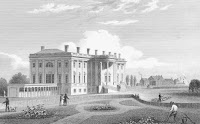
In this damning New Republic article, Johann Hari details how a rather fringe-ish British historian earned a three-hour meeting with George Bush (I can't bring myself to place the elevating title in front of his name these days). Couldn't hurt that Andrew Roberts considers W a Churchill for the 21st century, but that's among the least disturbing of his beliefs.
Here's a quick bulleting of Roberts' beliefs and actions as detailed in the article:
- Regularly describes the British empire as "glorious"
- Spoke to the Springbok Club in 2001, a South African group, which still flies the flag of apartheid South Africa at its meetings and extols "the re-establishment of civilized European rule throughout the African continent."
- Direct quote: "Just as we do not today differentiate between the Roman Republic and the imperial period of the Julio-Claudians when we think of the Roman Empire, so in the future no one will bother to make a distinction between the British Empire-led and the American Republic-led periods of English-speaking dominance."
- Defends various and sundry massacres for their settling effects
- "[H]e has advised Bush to adopt 'the whole idea of mass internment,' saying: 'I think it is the way the administration of Iraq should go.' At his lunch with Bush, according to economist Irwin Stelzer, who was present, Roberts cited Ireland as a place where internment worked."
- Defends British concentration camps used in the Boer War
- "He counsels that 'there can be no greater test of statesmanship than sticking to unpopular but correct policies.' The real threat isn't abroad, but at home, among domestic critics. Roberts writes, 'The greatest danger to [the British and, by extension, the American] continued imperium came not from declared enemies without, but rather from vociferous enemies within their own society.'"
- Similarly, on Vietnam, he writes: "Some of the media was indeed a prime enemy of the conflict."
Target civilians, introduce mass internment, don't worry about whether people hate you, bear down on dissent because it will sap the empire's willpower, ignore your critics because they're just jealous, and--above all--keep on fighting and you'll prevail.Roberts wrote TNR to rebut "Hari's despicable and cowardly attack," but if you read his letter, it seems he didn't have the heart (or ammunition) to respond most of what Hari actually had to say. And Hari takes the opportunity to write a pretty convincing, lengthy counter-rebuttal.
It seems that Bush looks to historians as he looks to his advisers: to be told he's doing just fine. But to hear that message, he's had to scrape around for a fifth-rate Rudyard Kipling mocked by almost all serious historians and soaked in slaughter.
There's also some interesting debate in the comments about the validity or reductionism of employing terms like "racist," "white supremacist" or "imperialist ideology" when critiquing the likes of Roberts. Worth considering, for sure, but the term "imperialist" hardly seems a stretch when describing Roberts. Sounds like he'd embrace it. Kinda like cursing me with the term "humanist" or "liberal."
No comments:
Post a Comment